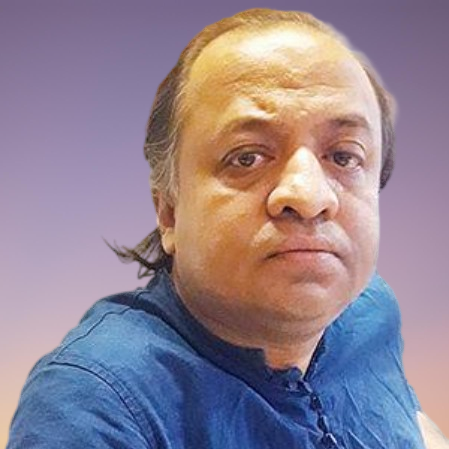Culture

"I think, a poet is different from others in his way of thinking, yearning and functioning in everyday life. A poet tends to contemplate his surroundings and the people next to him/her. Joys, woes, and other experiences affect him/her in a distinct and unparalleled way. A poet is quick to reach a human heart. He is also a magician of language," said Mahadev Saha in an exclusive interview with this writer. He is one of the leading romantic poets in contemporary Bengali literature. He is also a poet of mystery and muted ambiance. Ever since he took to poetry, he has been carefully removing himself from all disquiet and unsteadiness.
His love for beauty and nature comes through in a very animated and intimate manner in his canvas of poetry. "I use the imagery of the moon, sun, sky, lush greenery, clouds and other natural wonders in my poetry. I was born in a remote area of Sirajganj. In my early years I enjoyed rural beauty and the silent environment of pastoral areas. Raindrops on a tin roof, moonlit nights, the autumn skies, winter mornings and fishing at night -- these occupy vibrant episodes in my life. When I reflect on my childhood, I experience immense joy."
Mahadev Saha was born on August 5, 1944 in Dhanghara, Sirajganj. The only child of parents Godadhor Saha and Birajmohini, Mahadev completed his primary and high school education in his village. For higher education he went to Dhaka College, Bogra College and Rajshahi University. "In my student days, I enjoyed reading the great literary masters like Rabindranath Tagore, Kazi Nazrul Islam and Jibanananda Das," says the poet.
Mahadev is one of the foremost poets of the late '60s, an era marked with accomplishments and revolutionary ideas. He claims to be introvert and has no interest in personal relationships, partly because right from his adolescent days, the poet has contemplated on the eternal questions: Why are we born? Where will we go after death? "I observed the death of my relatives. Death can be peaceful when a life ends naturally," Mahadev reminisces.
"I started writing right from my school days. Nature, serenity and rivers encouraged me to delve into the art of poetry. It is a cathartic experience for me to write poems. Through this medium I experience a sense of fulfillment," says Mahadev.
The main elements in Saha's poetry are solitude, love, yearning, the Liberation War, scenic beauty, poverty, secularism and equal rights. The struggles and sorrows of the deprived spur him to write. The poet is deeply moved by the ravages of poverty. His style is unquestionably unique and evocative. His words and verses articulate the torments of a lonesome soul and a mourning heart.
Mahadev Saha is dreamy and given to flights of poetic fantasy. Besides being a visionary, the poet has regularly tried to express his personal feelings and observations through romanticism. One will read "Prem O Bhalobashar Kobita" avidly, and out of that experience one can easily read the poet's mind and bore into his soul. It is true that the meaning of love differs from one individual to another. But the expressions of love predominantly come to poetry, which indeed holds it aloft, in various forms. The rendering of love is very clear in the poems. His love for feminine beauty and natural objects comes in tandem with the frustrations and dissatisfaction associated with modern life.
After a close perusal of Saha's poetry, though it is very difficult to trace the exact silhouette of the poet's mind, one is quite clear about the fact that he is a modernist in the complete sense of the meaning. In his poems, one feels the lament of a lonely soul, an underlying sorrow, a feeling of emptiness but not without a push to face hard realities and other realisations that one can find only in life itself.
Mahadev's first book "Ei Griha Ei Sannyas" was published in 1972. His second book "Chai Bish, Amorata" was published in 1975. He has published 100 books including poetry, essays, books for children, poetry collections and a number of volumes of selected poems.
The 'magician of words' has won many prestigious awards like Ekushey Padak, Bangla Academy Award, Zebunnesa-Mahabubllah Award, Alaol Shahitya Award and Khalekdad Chowdhury Smriti Padak.
The writer is an art critic and cultural curator.

























Leave a Comment
Recent Posts
Auspicious beginnings, but a l ...
The newly elected government of Bangladesh is now in office, and the e ...
Caught between tigers and pira ...
Over 10,000 fishermen in the Sundarbans have suspended their fishing a ...
Historic Chawk Bazar comes alive with iftar items on ..
Shaping Young Conservationists: School Conservation ..
Iran has said it has reached an understanding with t ..
New Finance Minister Amir Khosru Mahmud Chowdhury